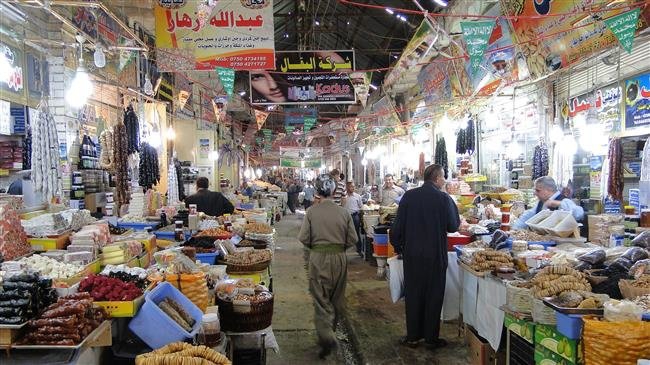Iranís business adviser at the countryís embassy in Baghdad was quoted as saying Tuesday that the Islamic Republic was already ahead of its plan, with non-oil exports currently standing at $4.5 billion.
ďBased on the average growth rate of 8.5% of non-oil exports and the realization of about $ 4.5 billion worth of these exports, we can say that we are 28% ahead of our export targets to Iraq,Ē Nasser Behzad said.
Iran is currently Iraq's top trade partner, with annual turnover of about $12 billion, according to Iraqi officials. By comparison, annual trade between Saudi Arabia and Iraq stands below $6 billion.
[caption id="" align="alignnone" width="555"]
 Trucks are waiting on the Iraqi side of the Wasit border crossing between Iran and Iraq, 120 km (74 miles) southeast of Baghdad, Nov. 17, 2007. (Photo by Reuters)[/caption]
Trucks are waiting on the Iraqi side of the Wasit border crossing between Iran and Iraq, 120 km (74 miles) southeast of Baghdad, Nov. 17, 2007. (Photo by Reuters)[/caption]Foodstuff, livestock, construction material and plastic products constitute the bulk of Iranís exports to Iraq. Iranian vehicles and food items are a ubiquitous sight in Iraq.
Behzad said as many as 26 programs have been drafted and approved for expansion of trade ties between Iran and Iraq, which will be pursued ďwith seriousnessĒ once the political situation stabilizes in the Arab country.
ďBoosting non-oil and energy exports, exchanging trade delegations, holding exhibitions, promoting Iranian goods, maintaining constant diplomatic and specialized consultations and helping companies increase their marketing knowledge are some of the plans,Ē he said.
The extent of Iraqís trade ties with Iran, however makes the country prone to US sanctions on the Islamic Republic.
In August, Prime Minister Haider al-Abadi said Iraq would be sending a delegation to the United States to seek waivers for financial transactions with Iran.
Abadi called the sanctions ďunilateralĒ and ďoppressiveĒ, adding that Iraq would not be ďpart of a blockadeĒ due to its own painful experience with international sanctions during the era of Saddam Hussein.
ďWe have presented a clear vision of what Iraq really needs. This includes Iranian natural gas, which is very important, as well as other trade and the electricity sector,Ē Reuters quoted him as saying.
The two neighbors are currently working on the supply of Iranian gas to Sadr, Baghdad and al-Mansuriya power plants through a 270-kilometer pipeline and to Basra near the Iranian border via a separate pipeline.
Iraq is also the biggest importer of electricity from Iran. The country was hit by a series of protests amid electricity shortages this summer.
Iran cut off electricity supplies to Iraq in July as rolling blackouts and water shortages in the southern Khuzestan province in the face of sizzling temperatures touched off a series of protests.
Iranís trade with the Kurdish Regional Government (KRG) is also booming after Baghdad lifted an embargo imposed in the aftermath of a secession referendum held in the semi-autonomous region last year.
One-third of Iran's non-oil exports to Iraq are reportedly destined for the KRG. The two sides have renovated their border-crossings and agreed on allowing to drop duties on certain commodities.











